- Home
- Alan Bennett
Alan Bennett: Plays, Volume 1 Page 13
Alan Bennett: Plays, Volume 1 Read online
Page 13
GEORGE: These, my dear, are going to their long home.
POLLY: Oh, George, they might come in handy for…
GEORGE: No. They would not come in handy for anything. They are not going to Oxfam; they are not going to the Thrift Shop. They are going into the dustbin where they belong.
POLLY: Perhaps Geoff could use them.
GEORGE: No. Nobody can use them. Nobody is going to use them. They are rubbish, waste, junk. (He is triumphant.)
Dustbin Ho!
(GEORGE and ENID depart and we hear the clank of a dustbin lid. POLLY comes over to GEOFF. They hold each other, GEOFF with his back to the audience staring over her shoulder at the bookcase.)
GEOFF: Has he read all these?
(He picks out a book, without disengaging POLLY.)
POLLY: Doubt it. That’s mine. Empson. Seven Types of Ambiguity. I actually made notes on it.
GEOFF: Would I like that?
POLLY: (Almost laughing) No. (Then seeing the offence.) No.
GEOFF: I might.
POLLY: You wouldn’t.
GEOFF: You mean, I wouldn’t understand it.
POLLY: No. I mean, yes. But I shouldn’t bother. Most of these are a waste of time.
GEOFF: Is it non-fiction?
POLLY: Yes. (Again laughing and upsetting him.)
GEOFF: Is it I’m not fit to read them or they’re too hard for me to read?
POLLY: They wouldn’t interest you. Geoff. Read what you like. Don’t go into a huff. What does it matter, anyway? It’s all going to be cassettes now, isn’t it? (Sound of someone coming in and they break up. BRIAN enters with a couple of bottles of wine. GEOFF kneels at the gravestone, cleaning it.)
BRIAN: Here I am with my little lot. Am I welcome or am I not?
(He raises his hand in greeting to GEOFF, sees the stone and begins to advance on it.)
POLLY: (Quickly) Come and give me a hand with the lunch.
BRIAN: Yes. Yes. Yes. Yes. (BRIAN Winks at GEOFF.)
You making yourself useful?
GEOFF: You bet.
BRIAN: Friend of yours? What’s the matter?
(BRIAN walks round it, without saying anything, then steps over it.) Somebody walked over your grave? Ho ho.
(He touches GEOFF with his shoe.)
GEOFF: (In an undertone) Knock it off, will you?
POLLY: George is a bore. He’s just thrown away a whole jorum of stuff. They’d have made such a lovely parcel for Oxfam. Geoff, nip out and see whether he’s chucked out anything worth keeping. I can’t bear it. You can have whatever you want.
BRIAN: Do you think Oxfam ever return anything? Oxfam graciously acknowledges the receipt of your gift but feel they must return this pair of old knickers as they would only aggravate the situation. How many are we? (As he lays the table.)
POLLY: Five. I don’t think Andy’s in. Give him a shout. (BRIAN shouts upstairs.)
BRIAN: Andy! No. (POLLY scatters potato peelings on the floor.)
POLLY: Oh, Dame Agnes, if you could see me now. (She still has hold of the book GEOFF picked out and is looking at her notes.)
BRIAN: Dame Agnes who?
POLLY: Dame Agnes Bemrose, Mistress of Girton, the apple of whose eye I for a short time was.
BRIAN: Are we having a pudding?
POLLY: No-o. She thought I had a great future.
BRIAN: As what?
POLLY: It was never specified. I once fancied I’d like to be Mistress of Girton, then I decided I’d settle for being a lady novelist, rather along the lines of Virginia Woolf, and then that, too, dwindled into getting into the BBC. And now here I am, ankle deep in blighted hopes and potato peelings. ‘Remember, Miss Baker, there is no Nobel Prize for Knitting.’
BRIAN: I never thought of you as at all academic. You’re not that sort at all. Like me.
POLLY: Did you never want to go to university?
BRIAN: Didn’t mind. Could have done. Went straight into the works instead. I wanted to get started.
POLLY: I was a bright girl. I had some interesting ideas on Coleridge’s inner landscape. Then George came down to speak to the Labour Club one night in the Spring Term and that was it. You’d have done very well.
BRIAN: Not then. Now perhaps. I liked provincial life. The works all week, rugger with the boys on Saturdays and a piss-up in Knutsford afterwards. I reckon it was the army changed me. But for a certain medical corporal I was all headed for a smart wedding at the cathedral and two pages of photographs in Cheshire Life, winter holidays in the Bahamas and two piggy children at Oundle.
POLLY: Education didn’t alter me one bit. Falling in love, sex, the children, they’ve altered me. I had a good education but it never went to my head, somehow. It should be a journey ending up with you at a different place. It didn’t take with me. My degree was a kind of inoculation. I got just enough education to make me immune to it for the rest of my life. Now I couldn’t tell you the first thing about Coleridge’s inner landscape. All wasted.
BRIAN: I don’t want to know about Coleridge, thank you. I just want my lunch. Or dinner as my father the mill-owner would say.
POLLY: Anyway, it’s a good thing I didn’t get a better degree or George would never have married me.
BRIAN: Come on.
POLLY: True. That’s why he got rid of the first Mrs Oliver. She was too clever by half. But I haven’t changed. Coleridge’s imagery. Odd bits of junk. Picking up bits of stuff other people haven’t spotted. What medical corporal?
BRIAN: Never mind.
POLLY: Now Andy’s talking about leaving school, doing something useful. I haven’t dared tell George. What does it matter? It doesn’t get you any further, education.
BRIAN: It’s not designed to. Or rather it is designed to, and that’s what’s wrong with it. Or so George would say. We in the Conservative Party think exactly the opposite.
POLLY: I don’t know what you think at all. You don’t care much, do you?
BRIAN: Not much, no.
POLLY: And Parliament. That either?
BRIAN: Passes the time. Fills in that awkward gap between the cradle and the grave. (BRIAN sees the postcard he gave POLLY stuck in the mirror. He viciously takes it out, and tears it up.)
POLLY: Brian, I liked that.
BRIAN: Here’s another one instead.
(Takes out another postcard.)
POLLY: Is it the same one?
BRIAN: I expect so.
POLLY: No message. Do you get lots of them?
BRIAN: Not lots. Every three months maybe.
POLLY: But why? It must be somebody who’s mad.
BRIAN: Not entirely. I always get one if I’ve been in the news, or on television. If I raise my voice anywhere.
POLLY: What for, if there’s no message? It’s not even like an anonymous letter.
BRIAN: Oh, but there is a message, you see. He knows what it means and I know what it means.
POLLY: What?
BRIAN: A long time ago, at least, not so long really, when I’d just come out of the army and was still full time at the works. Before I was an MP. Quite a long time before, in fact, he must have been very smart to pick it out I was the same person.
POLLY: What same person?
BRIAN: I was had up for you know what with some youth in
Victoria Park, Oswestry.
POLLY: I never knew that.
BRIAN: I should hope not. Mind you, it was so dull. It was scarcely in the papers. But he knows, whoever he is.
POLLY: How foul. Why don’t you go to the police?
BRIAN: What for? It’s not blackmail. It’s just a picture of Victoria Park, Oswestry. It’s actually a new one, that one. I haven’t had that one before. The other one used to be rather a nice sepia photograph. They’ve obviously run out of stock.
POLLY: Well, I’m not having it up there. (She tears it up.) Why did you never say?
BRIAN: It’s funny the place, really, isn’t it? Lavatories, public parks, cinemas in the afternoon, the places where it ha
ppens. It can’t ever be tragic, sad even, the setting’s so banal. Nothing to say, why should I? Every now and again somebody pops down the road to the post. I’ve got now so that I can almost feel them coming.
POLLY: People are foul.
BRIAN: Yours, A Well-wisher.
(GEOFF comes back, and POLLY starts to bustle round again.)
GEOFF: What a load of old rubbish!
BRIAN: So why all this fuss about James. If it didn’t take with you, why bother?
POLLY: He’s a boy. He’s got to get on in the world. He can’t rely on being seduced at the Labour Club dance.
BRIAN: He could always try the Conservative Club.
POLLY: Watch it, you’ll corrupt the youth. (GEOFF is still cleaning the gravestone.)
BRIAN: Youth? Servants. (He taps GEOFF with his foot.)
POLLY: Geoff isn’t servants, are you, love?
GEOFF: Aren’t I?
POLLY: No, course you’re not.
GEOFF: No, say it. Servants. Yes. We’re servants for the people who aren’t used to having servants, servants who don’t make you feel guilty about it. That’s probably because you’re not sure our lives aren’t better than yours.
POLLY: Look, Geoff, I said I was sorry.
GEOFF: Skip it. (GEORGE enters breathless.)
GEORGE: Where’s the bucket?
POLLY: What bucket?
GEORGE: The bucket. Quick, quick, for God’s sake, where’s the bucket?
POLLY: What bucket?
GEORGE: The bucket. The bowl, anything. Come on. It’s the dog. It’s there.
POLLY: What? Oh, no, George, you can’t.
GEORGE: Yes, I bloody well can. (He rushes out with the dripping pail. Shouts outside as he throws the water. He returns, satisfied.) Got it. Purple in the face as it was passing some particularly recalcitrant stool. It leaped out of its skin. Sodden.
POLLY: It’s not the dog’s fault.
GEORGE: Maybe. Sometimes I think St Francis of Assisi was barking up the wrong tree. Of course it’s the dog’s fault. If it will choose our step. (He is about to throw another one, when there is a knocking at the door. GEORGE opens it, bucket in hand, sees who it is, turns round smartly and comes away from the door, followed in by MRS BRODRIBB.)
MRS BRODRIBB: One moment, young man. Some person on these premises has just thrown a bucket of water over my dog. I have just met him running down the street soaked to the skin.
GEORGE: Your dog, Mrs Brodribb?
MRS BRODRIBB: My dog, Mr Oliver.
POLLY: What makes you think it was here?
GEORGE: Polly. If by dog, Mrs Brodribb, you mean that polka-dotted sewage machine on legs, yes. It was me.
MRS BRODRIBB: So, you admit it … he admits it. You ought to be ashamed of yourself, a man in your position, an unprovoked assault.
GEORGE: Unprovoked? Unprovoked? Mrs Brodribb, I have lost count of the number of times that creature has fouled our doorstep. It’s every time he shoves his arse outside your door.
MRS BRODRIBB: Arse! Oh!
POLLY: It does happen rather often, Mrs Brodribb. I’m sure my husband didn’t mean to harm him, only to teach him a lesson.
MRS BRODRIBB: If you wanted to attack a defenceless dog why didn’t you choose one your own size? They have to go somewhere.
GEORGE: Then why not on your own doorstep then?
MRS BRODRIBB: Because he needs the walk. Besides, you should be flattered.
POLLY: Flattered!
MRS BRODRIBB: When Max …
GEOFF: Max!
MRS BRODRIBB: (Silencing him with a look) … pauses by your doorstep he is not simply relieving himself. He is leaving a message, a sign, a note.
GEORGE: A message, is it? Then I wish he wasn’t quite such a frequent correspondent. Your dog, Mrs Brodribb, is a proper little Mme de Sévigné. Besides, who is it leaving a message for, for God’s sake? Not for anybody at this address. We haven’t any dogs. We have a goldfish and a hamster. Surely he’s not contemplating starting up a deviant relationship with them?
MRS BRODRIBB: Don’t you be sarcastic with me. I don’t want any of your House of Commons manners here. I know one thing. I shan’t ever vote Socialist after this. Not that I ever did.
GEORGE: And another thing, Mrs Brodribb. This leaving notes business. Presumably it’s to do with … I’m sorry to have to mention this word… but it has to do with sex, hasn’t it?
MRS BRODRIBB: (Who has been circling round the company, stares long and deep into BRIAN’s face) I’ve seen you on television, too. You’re all the same.
GEORGE: Sex, Mrs Brodribb. But Max can go on leaving little notes for other dogs on our step until he’s blue in the face, but I bet you never let him out to back them up, do you? Except once a year with some other equally spotted bitch under medical supervision at forty guineas a time in some foul kennels in Hounslow. So what’s all this message leaving, Mrs Brodribb? What are all these notes? I’ll tell you what Max is, Mrs Brodribb. He’s all talk and no trousers. But for future reference I am not going to have my doorstep used as a poste restante by frustrated dalmatians who never come. And I mean come, Mrs Brodribb.
POLLY: We have got a bit fed up of it.
MRS BRODRIBB: It? It? What you call it, Mrs Oliver, is an extremely sensitive creature, twice champion in his class at Crufts and a thoroughbred dalmatian. That dog, as you call it, has ten times more breeding than you have.
GEORGE: Mrs Brodribb. Shit has no pedigree.
MRS BRODRIBB: Did you hear that? Did you hear that? Such … language, and from one of our elected representatives. But I give you fair warning, if there is any repetition of this incident, if you ever interfere with Max again, I shall be forced to fetch my husband, diabetic though he be. And that’s my last word.
GEOFF: Aw, piss off, you old cow.
(ENID comes in with a jug just as MRS BRODRIBB is going out.)
MRS BRODRIBB: If we had a real Conservative government I should have you horsewhipped.
(ENID is mystified, GEOFF bursts out laughing, and there is a general hubbub.
enid goes upstage into the kitchen with GEORGE and brian and is told about MRS BRODRIBB in half-heard dialogue which goes on under the action, from various people.)
ALL: She’s a silly woman from the other end of the road. George just threw a bucket of water over her dog. The dalmatian. Ought to have thrown it over her. Quite. Who wants beer? How many are we? I hope the chicken’ll be big enough. Where’s salt and pepper, etc. etc?
(POLLY comes downstage where GEOFF is still fiddling with the tombstone.)
POLLY: Come on, Geoff.
GEOFF: In a sec.
(ANDY comes in by the outside door.)
GEORGE: Now. I never forget a face. That, unless I’m very much mistaken, is my son.
ANDY: There you go, George. Go to the top of the class.
POLLY: Andy!
ENID: Come, give me a kiss, dear. Mmm. Isn’t his hair lovely. Lovely. Mmm.
POLLY: Wash your hands, love, we’re all ready.
ENID: How lovely. Where’ve you been, dear?
ANDY: Been over the park.
BRIAN: Does it matter where we all sit?
(POLLY indicating places.)
POLLY: George, Enid, Andy, me, Brian.
ENID: How lovely, we’re all together.
POLLY: And Geoff.
(GEOFF comes slowly to the table as the curtain comes down.)
END OF ACT ONE
ACT TWO
GEORGE and POLLY are getting ready to go out. GEOFF is busy putting yet more shelves up in the kitchen. POLLY is ironing her skirt for the function, or sewing something on to her dress. GEORGE is in a dress shirt. It is evening and the children, as ever, are in bed.
GEORGE: Put my cuff-links in, will you?
POLLY: Geoff’ll do it. I’ve still got to get washed. (GEORGE goes over to GEOFF.)
GEORGE: (To POLLY) You’re going to have to get a move on. (To GEOFF.) Are you baby-sitting?
GEOFF: Me
? No. You’re dropping me off, aren’t you? (To POLLY.)
POLLY: Andy’s sitting. I asked him this morning.
GEORG: (Edging over to the table where his watch is, so that EOFF has to follow him still trying to put in his links) Does he now what time we’ve got to be there?
POLLY: Don’t get all agitato.
GEORGE: What time have we got to be there? Thank you.
GEOFF: (Looking at card in mirror) Eight.
POLLY: Eight for anything or just eight?
GEOFF: Eight.
POLLY: That means eight-fifteen.
GEORGE: It means eight. It isn’t as if we were just going out to Enid or somebody.
POLLY: Better start ringing a taxi.
GEORGE: The car should have been back today.
POLLY: I don’t know why we bother with the garage. Geoff is marvellous with engines.
GEORGE: (Telephoning) There ought to be somewhere to go to get not only service for the car but also absolution for the sin of owning it.
POLLY: Sin. I don’t know what we’d do without it.
GEORGE: What I would like is the bare essentials, a car like a monastic cell swept clean of dangling dolls, jokey notices, scatter cushions and … Hello. I want a taxi, please, to … Ah you’re not 3232. I did dial it. Sorry you’ve been troubled. Goodbye, madam. A car shot of all the paraphernalia of dedicated motoring. What I want is an Austin Ascetic, a Morris Monk or a Triumph Trappist. Good evening. Could we have a taxi, please, in about … how long?
POLLY: Three-quarters of an hour.
GEORGE: Half an hour;17 Passfield Gardens, Highgate. The name is Oliver.
POLLY: Say MP. It always helps.
GEORGE: MP. I wasn’t giving you my initials. Never mind. The number is Dickens 0310. Dickens of Oliver Twist fame. DIC is the same as the code. I know the Post Office is asking us to use all figure numbers. But I am ringing up for a taxi not for the latest developments in telecommunications.
POLLY: We’ll never get one if you’re rude to them. For God’s sake, be NICE.
GEORGE: The Dickens number is 432 … I mean 342 … 0310. Yes, I will hold on. Geoff, hold on for me, will you?
POLLY: I wish it wasn’t tonight. We shall miss you on the telly.
GEORGE: It’s old stock most of it. (Picking up some ornament.) Where’s this thing from?
POLLY: It’s a present.

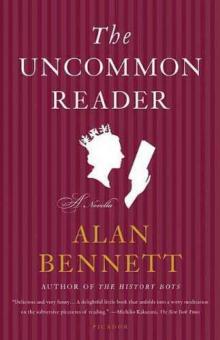 The Uncommon Reader: A Novella
The Uncommon Reader: A Novella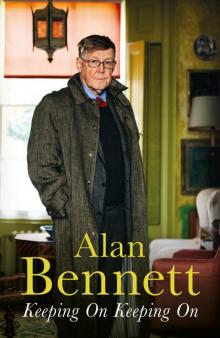 Keeping On Keeping On
Keeping On Keeping On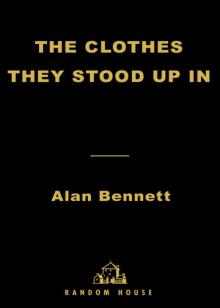 The Clothes They Stood Up In
The Clothes They Stood Up In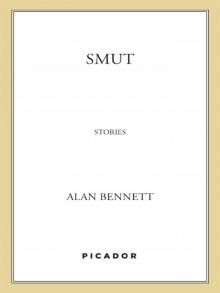 Smut: Stories
Smut: Stories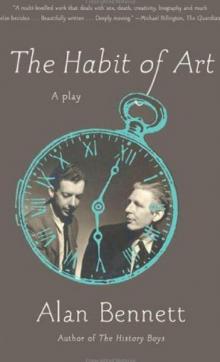 The Habit of Art: A Play
The Habit of Art: A Play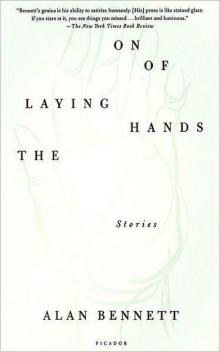 The Laying on of Hands: Stories
The Laying on of Hands: Stories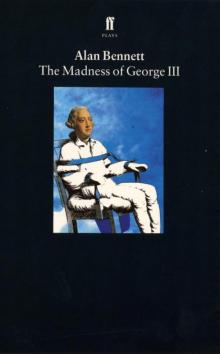 The Madness of George III
The Madness of George III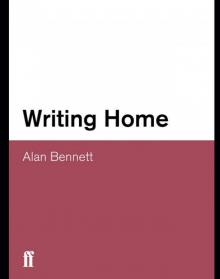 Writing Home
Writing Home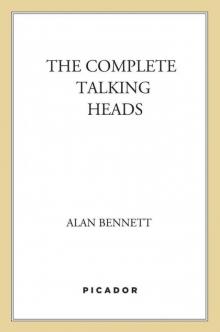 The Complete Talking Heads
The Complete Talking Heads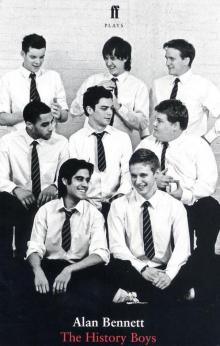 The History Boys
The History Boys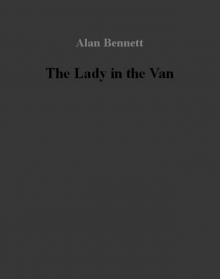 Lady in the Van
Lady in the Van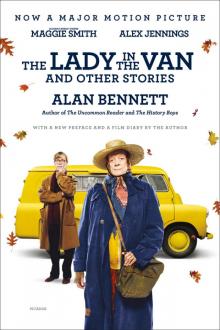 The Lady in the Van
The Lady in the Van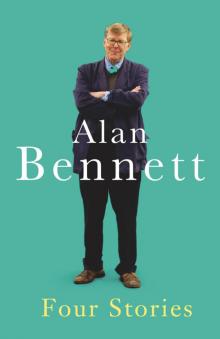 Four Stories
Four Stories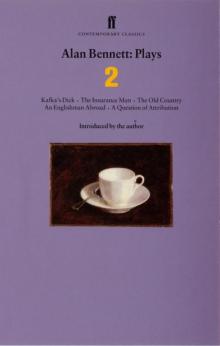 Alan Bennett: Plays, Volume 2
Alan Bennett: Plays, Volume 2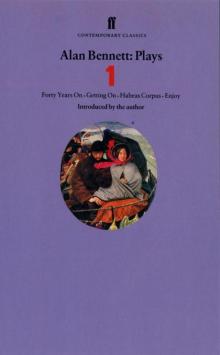 Alan Bennett: Plays, Volume 1
Alan Bennett: Plays, Volume 1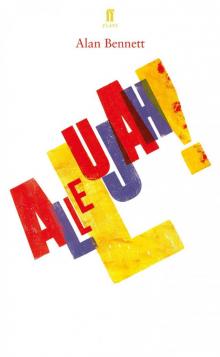 Allelujah!
Allelujah!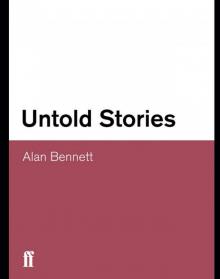 Untold Stories
Untold Stories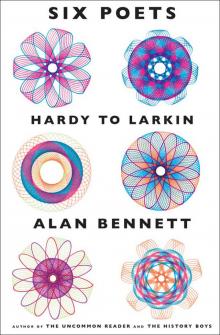 Six Poets
Six Poets